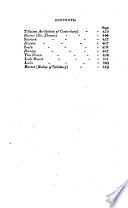 | George Burnett - 1807 - عدد الصفحات: 556
...tragediesi Our author himself, I conceive, is shadowed." Shakspeare. To begin, then, with Shakspeare, He was the man, who of all modern, and perhaps ancient...them not laboriously, but luckily : when he describes any thing, you more than see it — you feel it too. Those who accuse him to have wanted learning,... | |
 | George Burnett - 1807 - عدد الصفحات: 1152
...tragedies. Our author himself, I conceive, is shadowed." SJialapeare. To begin, then, with Shakspeare. He was the man, who of all modern, and perhaps ancient poets, had the largest and most comppehensive sool. Alt the images of nature were still present to him, and he drew them not laboriously,... | |
 | Hugh Blair - 1807 - عدد الصفحات: 402
...character whioh Dryden has drawn of Shakespeare is not only just, but tiacomtnonly elegant and happy. "He was the man, who of all modern, and perhaps ancient poets, had the largest and ran t comprehensive s.sul. All the images of nature were still present to him, and he drew them not... | |
 | John Dryden, Walter Scott - 1808 - عدد الصفحات: 432
...of them, in my opinion, at least his equal, perhaps his superior. * To begin then with Shakespeare. He was the man who of all modern, and perhaps ancient...them not laboriously, but luckily : when he describes any thing, you more than see it, you feel it too. Those who accuse him to have wanted learning, give... | |
 | William Shakespeare - 1809 - عدد الصفحات: 390
...was yet not rectified, nor his allusions understood; yet then did Dryden-pronounce, "that Shakspeare was the man, who, of all modern, and perhaps ancient...them not laboriously, but luckily: when he describes any thing, you more than see it, you feel it too. Those, who accuse him to have wanted learning, give... | |
 | William Shakespeare - 1809 - عدد الصفحات: 394
...was yet not rectified, nor his allusions understood; yet then did Dryden pronounce, " that Shakspenre was the man, who, of all modern, and perhaps ancient...them not laboriously, but luckily: when he describes any thing, you more than see it, you feel it too. Those, who accuse him to have wanted learning, give... | |
 | 1809 - عدد الصفحات: 604
...the man, who of dl modern, and perhaps ancient poets, had the largest and most comprehensive toul. AH the images of nature were still present to him, and...them not laboriously, but luckily : when he describes any thing, you more than see it — you feel it too. Those who accuse him to have "wanted learning,... | |
 | Samuel Johnson - 1809 - عدد الصفحات: 488
...man, who, of all moderri and perhaps ancient poets, had the largest and most comprehensive soul. AH the images of nature were still present to him, and he drew them not laboriously, but luckily ; \vhen he describes any thing, you. more than se,e it, yow feel it too. Those, who accuse him to have... | |
 | William Shakespeare - 1810 - عدد الصفحات: 444
...fioets, had the largest and most comfirehensive soul. All the images of nature were stilt firesent to him, and he drew them not laboriously, but luckily : when he describes any thing, you more than see it, you feel if too. Those, who accuse him to have wanted learning, give... | |
 | Friedrich Bouterivek - 1810 - عدد الصفحات: 492
...Ancient Poets, had the largeft and moft comprchennve Soul. AU the Images of Nature were füll prefent to him , and he drew them not laboriously , but luckily. When he deferí» bei any thing, you more than fee- it, you feel it too. Thofe who accufc him to have wanted... | |
| |